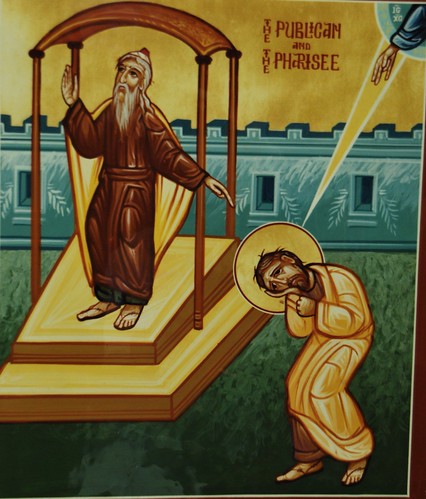This evening, before Great Compline began, we were fortunate to have a visitor: the priest from the local Serbian church. He is from the old country and is very tall and imposing. He has a beautiful baritone (I remember when he chanted in Serbian the troparia to St. Nicholas and was just astounded how beautiful it was). And he is a kind man.
Sitting down next to me and a fellow chanter, he asked (though he already knew) if we were going to chant Great Compline. I responded yes. He then retorted, "It's like a monastery." We all chuckled. Now, I know he was joking. We are a simple parish church. I think we may have some future monastics among us and maybe even some who practice a truncated form of monasticism, but a monastery we are not. But, every good joke has an specter of truth behind it.
It seems to be a pretty accurate picture that a great number (not a majority, I think) of Orthodox churches in this country do not, even during Lent, increase the amount of services. Not all churches have the Wednesday Liturgy of the Presanctified. Church services continue as normal on Sundays and Sundays only. Holy Week is a different story. Of course, a lot of this has to do with the fact that there were simply many areas of the United States where immigrants from Greece, Russia, the Levant, Romania, Bulgaria, etc. did not have priests to minister to them. A priest may have been available only once a month or maybe even once a year. Thus, there were fewer services and so the laity came to be accustomed with maybe celebrating one liturgy a month, if that. More services were simply out of the question. And so, that became the standard.
Of course, today, with greater ease of transportation, such problems are mitigated, though many Orthodox communities struggle to have a full time priest especially in more isolated areas of the United States. And even in those communities, only Sunday liturgies are the norm because that's a huge increase from what was available only a generation ago.
Despite that, I find it odd that a church having services outside of Sunday liturgy may be jokingly referred to as a monastery. The hours are not just for monastics. It is impossible for one who lives in the world to set enough time aside to worship and pray as a monastic. So, why should the presence of one of the hours in a parish church warrant this particular label?
I have my theories, none of which I like including that there is a hostility towards monasteries, especially from people who are from the old country. But there are plenty of people from the old countries who enter monasteries here in the New World. Maybe I'm reading too much into one little comment. I was certainly not offended by it, but I always like to find out the origins of things. Or perhaps I'm traveling down a road to nowhere. It would not be the first time!
Prayers please
3 hours ago






